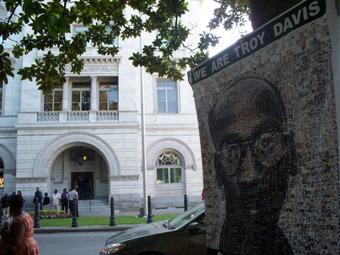
Section Branding
Header Content
Davis Case Now In Judge's Hands
Primary Content

A pair of bloody shorts. A new eye-witness account. A judge's testy remarks.
These are a few of the clues that the throngs of people who are interested in the Troy Davis case have to go on now as they wait a ruling by the honorable William Moore.
Thursday marked the end of a highly unusual two-day hearing in Savannah.
The U.S. Supreme Court ordered the hearing to determine if new evidence could have proven that Davis, who's on death row for the 1989 killing of Savannah police officer Mark MacPhail, was not the killer.
Lawyers for Davis got their big day on Wednesday.
That's when they called a parade of witnesses who testified that police coerced them into fingering Davis.
That's when they hauled from jail a man who testified, for the first time ever, that he saw another man shoot McPhail.
That's when police detectives defended their work from questions about shotty work and dropped leads.
But the government got its chance, too, on Thursday.
Their biggest bombshell was a pair of blood-stained shorts that detectives found in a washing machine at the house where Davis lived.
But whose blood was it?
The experts dueled in two reports. Those for the government said that it belonged to Davis. Those for Davis said that it was inconclusive.
Both sides agreed that there wasn't enough blood to test for DNA.
The government also questioned why Davis' lawyers didn't subpoena the man whom Davis' lawyers believe is the real killer, Sylvester "Red" Coles.
It was a question Moore wanted answered, as well.
And when Davis' lawyers answered the judge, it sent Moore into a testy, exhasperated mood that seemed to sour the rest of his day.
Davis' lawyers said, there was no point in bringing Coles to testify because he just would've denied killing MacPhail.
Anyway, they said, they tried to subpoena Coles yesterday but couldn't get him.
"Yesterday? This is the 12th hour!" exclaimed the judge. "It's obvious you didn't call him as a witness because you didn't want him subject to the state's cross-examination... We're not going to proceed this way."
And so he proceeded to block some Davis-friendly testimony.
The day ended with lawyers on both sides offering their opinions on a slew of complex legal questions created by the highly unusual hearing.
It's the first time in a half-century that the U.S. Supreme Court has stepped in for a case like this.
And, death penalty opponents hope, it could be a prelude to the high court finding that America's system of laws forbids an innocent person from being executed, which, perhaps surprisingly to some people, it currently does not.
Moore has to consider:
How high should Davis have to jump to prove innocence: Reasonable doubt? Clear probability? Clear and convincing evidence?
And who has jurisdiction in this case: Was the original trial in state courts the main event? How can the federal court step in?
After court let out, on the sidewalks surrounding the imposing granite courthouse on Wright Square, these seemed like very real questions for the Davis and MacPhail families.
The slain officer's mother, Ann MacPhail, said, the judge has been very fair.
"I do feel good about it," MacPhail said. "And what he decides, except if [Davis] gets free, everything else I think I can handle."
Davis' mother, Virginia Davis, also expressed confidence in Moore.
"He has to make another decision," Davis said. "And I'm hoping that the decision he makes will be the right decision."
Moore didn't say when he'd issue a ruling, only that it wouldn't be "unreasonably" delayed.
Lawyers for both sides have until July 7th to answer the judge's written questions.
Tags: Troy Anthony Davis, Savannah, death penalty, Amnesty International, Troy Davis, GPB News, Martina Davis Correia, Mark MacPhail, Mark MacPhail Jr., Troy Davis hearing, Ann MacPhail, Virginia Davis
